When you are buying a home you are encouraged to test for radon, but what exactly is it? Radon occurs naturally when uranium and radium found in the soil breaks down and seeps into homes and buildings. When inhaled, it can be harmful and according to the EPA, can cause lung cancer. Because it is so harmful, our agents highly recommend testing for radon prior to closing on the home. Let’s break it down a little bit more.
How does radon enter my home?
Radon is a radioactive gas. Soil breaks down into a gas that enters your home through cracks in floors or walls, gaps around service pipes, or through your water supply. The gas gets trapped inside your home where it can build up to dangerous levels.
How do I test my home?
You can find radon gas test kits at Lowe’s, Home Depot and on Amazon.com. You can also call a local expert. If a neighborhood home reports low (or high) levels, please be aware it does not mean your home’s levels will be the same.
Can I fix elevated levels?
Fortunately, once the home has been tested, radon can be remedied by installing a mitigation system. The entire state of Iowa has been identified as Zone 1. Zone 1 means that the average radon level is more than 4 pCi/L (picocuries per liter). The Iowa Department of Public Health (IDPH) estimates that as many as 5 in 7 homes have elevated levels. Because of this, it’s important to test for radon before moving into a new home so mitigation can take place. While new homes can be built with radon-resistant features, it is still important to test a new home prior to occupancy even if preventive measures have been taken.
Remind me, what are the health effects of radon?
According to the EPA, the Surgeon General has warned that radon is the second leading cause of lung cancer and accounts for over 400 deaths per year in Iowa.
Bottom line, testing for radon is easy and relatively inexpensive to remedy. If you are interested in learning more, visit EPA.gov, check out this Radon Buyer & Seller Guide from the IDPH, speak with your REALTOR® or a radon elimination professional.





